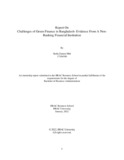| dc.contributor.advisor | Alam, Md. Kausar | |
| dc.contributor.author | Miti, Sadia Zaman | |
| dc.date.accessioned | 2022-06-07T05:09:11Z | |
| dc.date.available | 2022-06-07T05:09:11Z | |
| dc.date.copyright | 2022 | |
| dc.date.issued | 2022-01 | |
| dc.identifier.other | ID 17104180 | |
| dc.identifier.uri | http://hdl.handle.net/10361/16925 | |
| dc.description | This internship report is submitted in partial fulfillment of the requirements for the degree of Bachelor of Business Administration, 2022. | en_US |
| dc.description | Cataloged from PDF version of internship report. | |
| dc.description | Includes bibliographical references (page 50). | |
| dc.description.abstract | In order to complete the 90 days’ internship program, I secured my internship in FAS Finance & Investment Limited. FAS Finance is a non-bank financial institution, established in 1997, it has been rendering efficient financial advisory and services to the country for an extended period of time. As an NBFI, the key functionalities are related to loan disbursement in various sectors and others. The idea of writing the internship report focusing on green finance commenced with understanding and exploring the existing practices of green banking in FAS Finance.
The term green banking is a broad concept and encompasses several sub categories, of which green finance is a key essence. In order to instantaneously address the harmful effect of climate change, Bangladesh with assistance of its central bank launched a comprehensive Green Banking Policy Guidelines. The guidelines contained salient features to encourage active participation of the banking/FI sector to foster green growth. Despite having all the instruments, it is observed that the NBFIs (non-bank financial institutions) are lagging behind in terms of appropriate practice. The purpose of the study is to find out the probable challenges of the NBFIs could be facing in this matter through the perspective of FAS Finance & Investment Limited. Responses were collected through interviews and it was found that, there are several barriers that are hindering the proper green financing along with other green banking initiatives, which included lack of quality clients, higher cost of funds, lack of coverage; manpower etc. The study also realized that there's a lack of interest among clients regarding establishing green projects. Moreover, it was also evident that the proper in-house management is further hindered by lack of initiatives and commitment by the concerned. In response to the challenges, the report also suggests some corrective measures to be implemented in the existing regulatory framework on green financing added with recommendations to encourage and strengthen green financing activities in the NBFIs. | en_US |
| dc.description.statementofresponsibility | Sadia Zaman Miti | |
| dc.format.extent | 51 pages | |
| dc.language.iso | en | en_US |
| dc.publisher | Brac University | en_US |
| dc.rights | Brac University Internship reports are protected by copyright. They may be viewed from this source for any purpose, but reproduction or distribution in any format is prohibited without written permission. | |
| dc.subject | Non-bank financial institution | en_US |
| dc.subject | Green banking | en_US |
| dc.subject | FAS Finance & Investment Limited (FFIL) | en_US |
| dc.subject | Green Finance | en_US |
| dc.subject.lcsh | Economic development -- Environmental aspects. | |
| dc.subject.lcsh | Economic development -- Finance. | |
| dc.title | Challenges of green finance in Bangladesh- evidence from a non-banking financial institution | en_US |
| dc.type | Internship report | en_US |
| dc.contributor.department | Brac Business School, Brac University | |
| dc.description.degree | B. Business Administration | |

